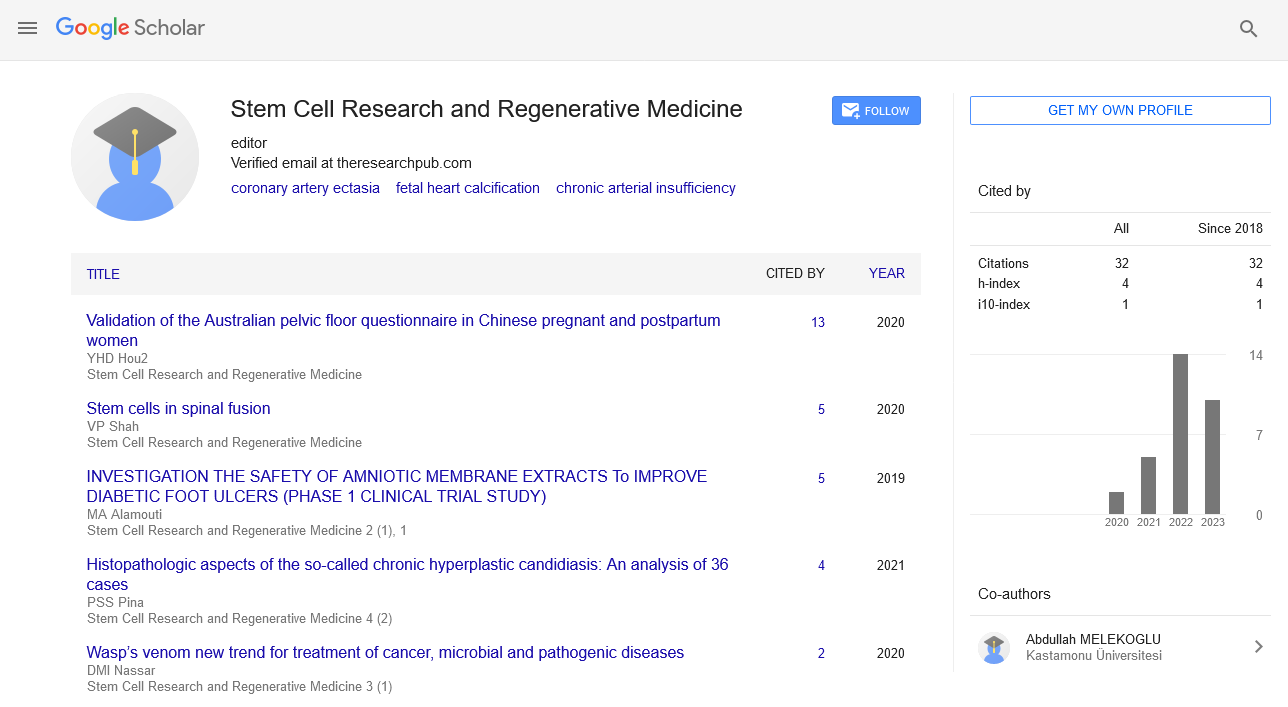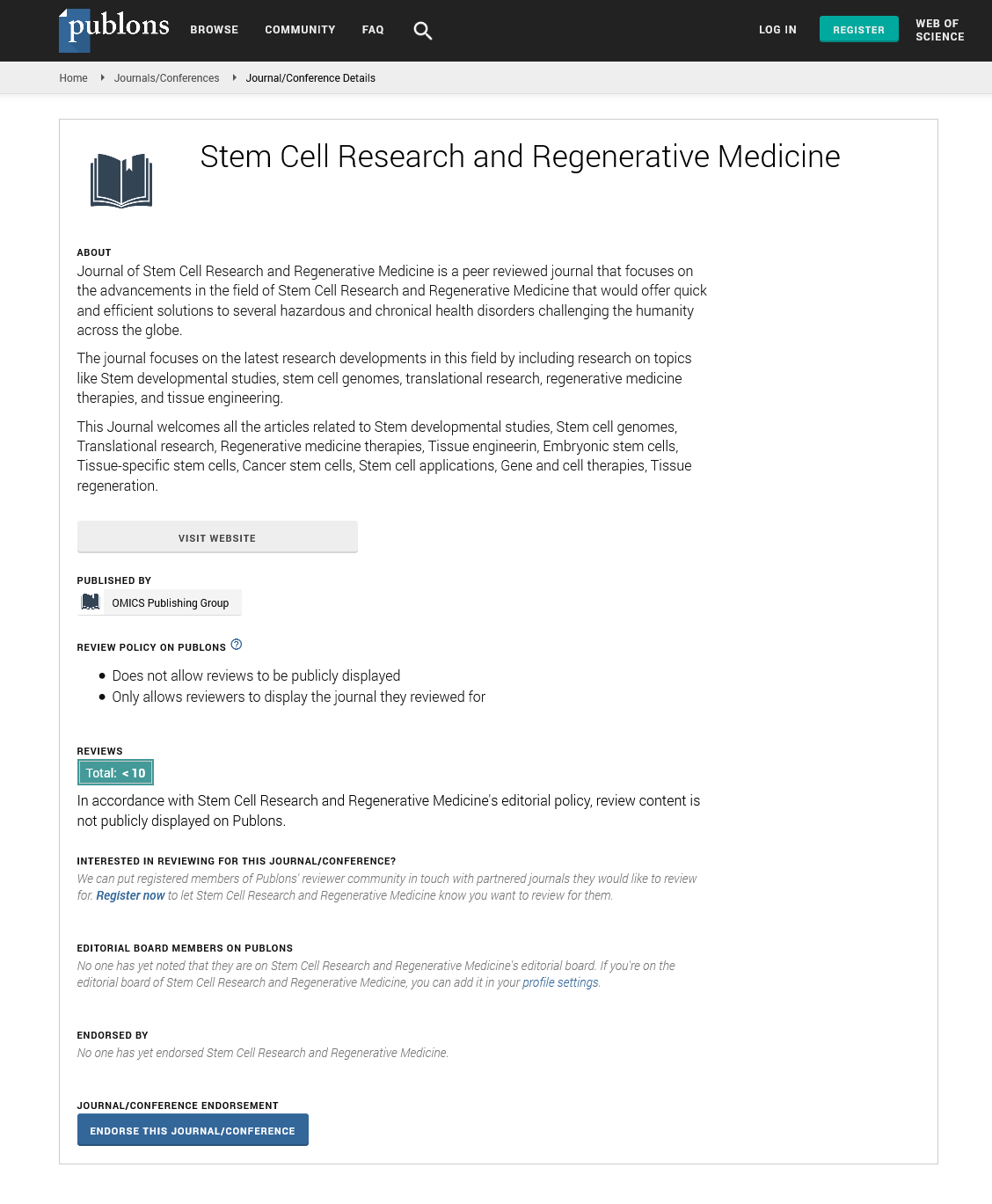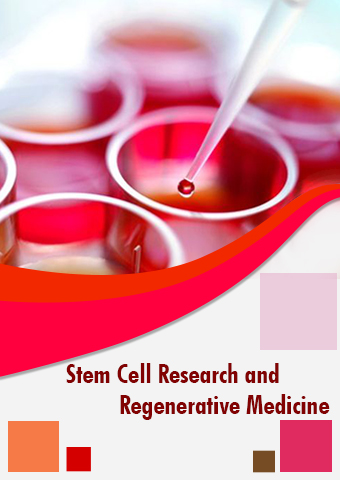Perspective - Stem Cell Research and Regenerative Medicine (2023) Volume 6, Issue 6
Transforming Healthcare: Cutting-Edge Innovations and New Treatments Shaping the Future
- Corresponding Author:
- Gustavo Duque
Department of Stem Cell and Research, East Aurora University, New York, USA
E-mail: GustavoD@mcgill.ca
Received: 10-Nov-2023, Manuscript No. SRRM-23-122125; Editor assigned: 13-Nov-2023, Pre QC No. SRRM-23-122125 (PQ); Reviewed: 27-Nov-2023, QC No. SRRM-23-122125; Revised: 04-Dec-2023, Manuscript No. SRRM-23-122125 (R); Published: 11-Dec-2023, DOI: 10.37532/SRRM.2023.6(6).147-148
Introduction
In the ever-evolving landscape of healthcare, revolutionary treatments and innovations are continually pushing the boundaries of what is possible. This article explores the latest advancements in medical science, covering a wide spectrum of new treatments and therapies that are changing the way we approach and manage health conditions. From precision medicine to regenerative therapies and beyond, these innovations are paving the way for a brighter and healthier future.
Description
Precision medicine: A tailored approach to care
Precision medicine, also known as personalized medicine, is a ground-breaking approach that customizes healthcare to the individual patient. By integrating an individual’s genetic makeup, lifestyle, and environmental factors, clinicians can tailor treatment plans that maximize efficacy while minimizing side effects. This approach is particularly transformative in the realm of cancer treatment, where therapies can be precisely matched to the unique characteristics of a patient’s tumor, leading to improved outcomes and reduced adverse effects.
Immunotherapy: Empowering the immune system
Immunotherapy represents a paradigm shift in cancer treatment. By leveraging the body’s immune system, this approach equips it to recognize and target cancer cells more effectively. Check point inhibitors, CAR-T cell therapy, and cancer vaccines are among the most promising immunotherapies, often providing new hope for patients with previously untreatable malignancies. The ability to harness the immune system’s power in the fight against cancer holds great promise for the future of oncology.
Gene editing and CRISPR technology: Precise genetic modification
CRISPR-Cas9 technology has unlocked the potential for precise and targeted genetic editing. This revolutionary tool allows researchers to modify genetic material with unprecedented accuracy, offering hope for individuals with genetic disorders such as sickle cell anemia and muscular dystrophy. The implications extend to other medical domains, including the treatment of infectious diseases, neurodegenerative conditions, and genetic predispositions to certain diseases, fundamentally changing how we approach genetic therapies.
Artificial intelligence in diagnostics: Accelerating disease detection
Artificial Intelligence (AI) is rapidly transforming medical diagnostics by processing vast amounts of data, enhancing the speed and accuracy of disease identification. Machine learning algorithms analyze diverse medical datasets, improving the early detection of conditions like Alzheimer’s, diabetes, and various cancers. AI-powered diagnostic tools are streamlining healthcare and shaping the future of preventive medicine.
Nano-medicine: A world of tiny miracles
Nanotechnology is revolutionizing medicine through the development of nano-medicine. Engineered nanoparticles are capable of targeting and treating diseases at the molecular level. By delivering drugs, heat, or radiation precisely to affected areas, nano-medicine minimizes side effects and optimizes treatment outcomes. This approach is particularly promising in cancer treatment, drug delivery, and regenerative medicine.
Stem cell therapies: Regeneration on the horizon
Stem cell therapies are advancing the field of regenerative medicine by utilizing the regenerative potential of stem cells. These therapies offer hope for conditions such as Parkinson’s disease, heart disease, and spinal cord injuries, aiming to repair or replace damaged tissues and organs. Stem cell treatments are on the cusp of transforming healthcare for patients with previously incurable conditions.
Telemedicine and remote monitoring: A virtual healthcare revolution
The adoption of telemedicine has skyrocketed, particularly in the wake of the COVID-19 pandemic. Telemedicine allows patients to receive medical consultations and monitoring from the comfort of their homes, improving healthcare accessibility. Remote monitoring devices enable real-time data collection, aiding in the management of chronic conditions and offering a proactive approach to patient care.
3D printing in healthcare: Customized solutions
3D printing technology is making substantial strides in healthcare by enabling the creation of personalized implants, prosthetics, and anatomical models for surgical planning. This innovation enhances patient care by offering tailored solutions for individuals with unique medical needs, ultimately improving their quality of life.
Psychedelic-assisted therapy: A mental health renaissance
Research into the therapeutic potential of psychedelic substances, such as psilocybin and MDMA, has gained momentum in the treatment of mental health conditions like depression, Post-Traumatic Stress Disorder (PTSD), and addiction. Early studies show promising results, leading to a re-evaluation of these substances’ legal status and their role in mental health treatment.
Personalized nutrition and gut health: Nourishing well-being
The emerging field of personalized nutrition tailors dietary recommendations to an individual’s unique micro-biome and nutritional needs. Understanding the role of gut health in overall well-being has opened doors to new treatments for conditions like irritable bowel syndrome, obesity, and autoimmune diseases, providing a holistic approach to health management.
Conclusion
In conclusion, healthcare is on the brink of transformation, thanks to these cutting-edge innovations and new treatments. Precision medicine, immunotherapy, gene editing, AI diagnostics, nano-medicine, stem cell therapies, telemedicine, 3D printing, psychedelic-assisted therapy, and personalized nutrition represent the forefront of healthcare progress. These developments hold the promise of better, more personalized healthcare, offering hope to patients and transforming the way we approach and manage various health conditions. The future of medicine is bright and filled with possibilities.


